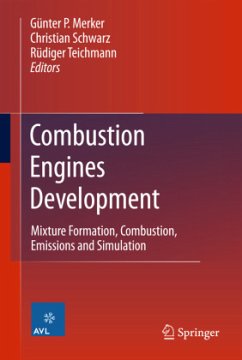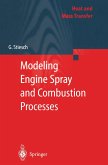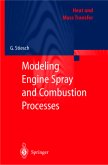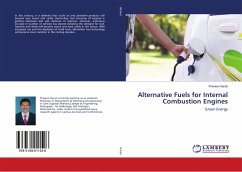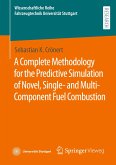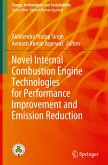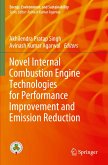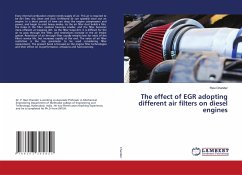Combustion Engines Development
Mixture Formation, Combustion, Emission and Simulation
Herausgegeben:Merker, Günter P.; Schwarz, Christian; Teichmann, Rüdiger
Combustion Engines Development
Mixture Formation, Combustion, Emission and Simulation
Herausgegeben:Merker, Günter P.; Schwarz, Christian; Teichmann, Rüdiger
- Gebundenes Buch
- Merkliste
- Auf die Merkliste
- Bewerten Bewerten
- Teilen
- Produkt teilen
- Produkterinnerung
- Produkterinnerung
With software simulations ever more ubiquitous in combustion engine development, this volume assesses cutting edge physical and chemical approaches and in doing so demonstrates both the potential and limitations of the models used for simulation.
Combustion Engines Development nowadays is based on simulation, not only of the transient reaction of vehicles or of the complete driveshaft, but also of the highly unsteady processes in the carburation process and the combustion chamber of an engine. Different physical and chemical approaches are described to show the potentials and limits of the models used for simulation.…mehr
Andere Kunden interessierten sich auch für
![Modeling Engine Spray and Combustion Processes Modeling Engine Spray and Combustion Processes]() Gunnar StieschModeling Engine Spray and Combustion Processes121,99 €
Gunnar StieschModeling Engine Spray and Combustion Processes121,99 €![Modeling Engine Spray and Combustion Processes Modeling Engine Spray and Combustion Processes]() Gunnar StieschModeling Engine Spray and Combustion Processes125,99 €
Gunnar StieschModeling Engine Spray and Combustion Processes125,99 €![Alternative Fuels for Internal Combustion Engines Alternative Fuels for Internal Combustion Engines]() Praveen HarariAlternative Fuels for Internal Combustion Engines54,99 €
Praveen HarariAlternative Fuels for Internal Combustion Engines54,99 €![A Complete Methodology for the Predictive Simulation of Novel, Single- and Multi-Component Fuel Combustion A Complete Methodology for the Predictive Simulation of Novel, Single- and Multi-Component Fuel Combustion]() Sebastian K. CrönertA Complete Methodology for the Predictive Simulation of Novel, Single- and Multi-Component Fuel Combustion81,99 €
Sebastian K. CrönertA Complete Methodology for the Predictive Simulation of Novel, Single- and Multi-Component Fuel Combustion81,99 €![Novel Internal Combustion Engine Technologies for Performance Improvement and Emission Reduction Novel Internal Combustion Engine Technologies for Performance Improvement and Emission Reduction]() Novel Internal Combustion Engine Technologies for Performance Improvement and Emission Reduction137,99 €
Novel Internal Combustion Engine Technologies for Performance Improvement and Emission Reduction137,99 €![Novel Internal Combustion Engine Technologies for Performance Improvement and Emission Reduction Novel Internal Combustion Engine Technologies for Performance Improvement and Emission Reduction]() Novel Internal Combustion Engine Technologies for Performance Improvement and Emission Reduction137,99 €
Novel Internal Combustion Engine Technologies for Performance Improvement and Emission Reduction137,99 €![The effect of EGR adopting different air filters on diesel engines The effect of EGR adopting different air filters on diesel engines]() Ravi ChanderThe effect of EGR adopting different air filters on diesel engines39,99 €
Ravi ChanderThe effect of EGR adopting different air filters on diesel engines39,99 €-
-
-
With software simulations ever more ubiquitous in combustion engine development, this volume assesses cutting edge physical and chemical approaches and in doing so demonstrates both the potential and limitations of the models used for simulation.
Combustion Engines Development nowadays is based on simulation, not only of the transient reaction of vehicles or of the complete driveshaft, but also of the highly unsteady processes in the carburation process and the combustion chamber of an engine. Different physical and chemical approaches are described to show the potentials and limits of the models used for simulation.
Combustion Engines Development nowadays is based on simulation, not only of the transient reaction of vehicles or of the complete driveshaft, but also of the highly unsteady processes in the carburation process and the combustion chamber of an engine. Different physical and chemical approaches are described to show the potentials and limits of the models used for simulation.
Produktdetails
- Produktdetails
- Verlag: Springer / Springer Berlin Heidelberg / Springer, Berlin / Vieweg+Teubner
- Artikelnr. des Verlages: 978-3-642-02951-6
- Seitenzahl: 642
- Erscheinungstermin: September 2011
- Englisch
- Abmessung: 244mm x 156mm x 37mm
- Gewicht: 1146g
- ISBN-13: 9783642029516
- ISBN-10: 3642029515
- Artikelnr.: 28439242
- Herstellerkennzeichnung Die Herstellerinformationen sind derzeit nicht verfügbar.
- Verlag: Springer / Springer Berlin Heidelberg / Springer, Berlin / Vieweg+Teubner
- Artikelnr. des Verlages: 978-3-642-02951-6
- Seitenzahl: 642
- Erscheinungstermin: September 2011
- Englisch
- Abmessung: 244mm x 156mm x 37mm
- Gewicht: 1146g
- ISBN-13: 9783642029516
- ISBN-10: 3642029515
- Artikelnr.: 28439242
- Herstellerkennzeichnung Die Herstellerinformationen sind derzeit nicht verfügbar.
Univ.-Prof. Dr.-Ing.habil. Günter P. Merker was born in Augsburg in 1942. Having finished an apprenticeship as a toolmaker, he studied at Rudolf-Diesel-Polytechnic in Augsburg (today Augsburg University of Applied Sciences) (1960 to 1964), where he got his degree in mechanical engineering. He then carried on his studies of mechanical engineering at the Technical University in Munich and took his diploma there in 1969.
From 1969 to 1978, he worked as an assistant lecturer at the chair of thermodynamics. In 1974 he got his PhD on a thesis about free convection. From 1975 to 1976, he worked as a research fellow at the Californian Institute of Technology in Pasadena/California, devoting himself to problems in the theoretical analysis of free convection currents in shallow water.
Having returned to the Munich Technical University, he qualified as a university lecturer on a treatise about problems in stability at free convection in 1978. He was appointed private lecturer and got the venia legendi in thermodynamics. From 1978 to 1980, he then worked at MTU GmbH in Munich as a special examiner for heat exchangers. In 1980 he accepted an associate professorship for refrigeration technology at the Karlsruhe University (Institute of Thermodynamics and Refrigeration Technology). During his time there, he was head of the department which was in charge of the final test procedures on any household, refrigeration and freezer appliance. In 1986 he started work at MTU Friedrichshafen, where he was manager of the department analytics and engine calculation. This department also included the branches thermodynamics of engines, exhaust-driven turbochargers, tuning the internal combustion engine with the appropriate ATL, process simulation, stability of components and mechanical oscillation.
In 1994 he accepted a full professorship for combustion engines at the University of Hannover. There he was head of the Institute of Technical Combustion until he was given emeritus status in 2005. During that time he concentrated on his work on experimental and theoretical research on combustion in diesel engines (commercial vehicles), and he developed a special twin pressure common rail injection system. He also led 43 graduate students to PhD, four of them to postdoctoral lecturing qualification.
He is the editor and co-editor of more than 140 technical scientific publications as well as six technical books on thermal transmission, fluid mechanics and combustion engines. He is a member of the Braunschweig Scientific Association as well as of different technical committees. In addition to that, he works as an independent adviser for engine manufactories and service industries.
Apl. Prof. Dr.-Ing. Habil.Christian Schwarz was born in Regensburg in 1964. From 1983 to 1988, he studied mechanical engineering at the Munich Technical University. From 1989 to 1993, he worked as an assistant lecturer at the chair of internal combustion engines and vehicles at the Munich Technical University (Prof. Woschni). During that time he worked on unsteady, 0-dimensional process calculation for charged and quickly working diesel engines and got his PhD in 1993 on his thesis 'Simulation of the transient reaction of charged diesel engines during operation'. Still at the same university, he was head of a team that worked on a part of the EU research project 'Hybrid Zero Emission Mobility' (1993 to 1997). In 1998 he qualified as a university lecturer, his treatise was on 'Theory and Simulation of Charged Combustion Engines'. He was appointed private lecturer by the University of Hannover in 1999, and he got the venia legendi in combustion engines. Since then he has been teaching the subject 'simulation of processes in combustion engines'. In 2004 the Hannover University conferred him the title 'apl. Prof.'.
In 1997 he started work in the department for advance development at BMW AG. In 2001 he was appointed head of this department and was responsible for the development of new combustion techniques for spark ignition (SI) engines, such as direct hydrogen ignition, as well as of new concepts for charged SI engines. Since 2004 he has been working in series development, being responsible for the development of combustion techniques of the SI engines produced in series. He has supervised several dissertations on combustion engines. Besides, he is the author and co-author of several publications and lectures, as well as of a technical book about combustion techniques and the charging of combustion engines.
In the research association about internal combustion engines, he is head of the planning team for total processes, and he is also part of its scientific advisory board.
From 1969 to 1978, he worked as an assistant lecturer at the chair of thermodynamics. In 1974 he got his PhD on a thesis about free convection. From 1975 to 1976, he worked as a research fellow at the Californian Institute of Technology in Pasadena/California, devoting himself to problems in the theoretical analysis of free convection currents in shallow water.
Having returned to the Munich Technical University, he qualified as a university lecturer on a treatise about problems in stability at free convection in 1978. He was appointed private lecturer and got the venia legendi in thermodynamics. From 1978 to 1980, he then worked at MTU GmbH in Munich as a special examiner for heat exchangers. In 1980 he accepted an associate professorship for refrigeration technology at the Karlsruhe University (Institute of Thermodynamics and Refrigeration Technology). During his time there, he was head of the department which was in charge of the final test procedures on any household, refrigeration and freezer appliance. In 1986 he started work at MTU Friedrichshafen, where he was manager of the department analytics and engine calculation. This department also included the branches thermodynamics of engines, exhaust-driven turbochargers, tuning the internal combustion engine with the appropriate ATL, process simulation, stability of components and mechanical oscillation.
In 1994 he accepted a full professorship for combustion engines at the University of Hannover. There he was head of the Institute of Technical Combustion until he was given emeritus status in 2005. During that time he concentrated on his work on experimental and theoretical research on combustion in diesel engines (commercial vehicles), and he developed a special twin pressure common rail injection system. He also led 43 graduate students to PhD, four of them to postdoctoral lecturing qualification.
He is the editor and co-editor of more than 140 technical scientific publications as well as six technical books on thermal transmission, fluid mechanics and combustion engines. He is a member of the Braunschweig Scientific Association as well as of different technical committees. In addition to that, he works as an independent adviser for engine manufactories and service industries.
Apl. Prof. Dr.-Ing. Habil.Christian Schwarz was born in Regensburg in 1964. From 1983 to 1988, he studied mechanical engineering at the Munich Technical University. From 1989 to 1993, he worked as an assistant lecturer at the chair of internal combustion engines and vehicles at the Munich Technical University (Prof. Woschni). During that time he worked on unsteady, 0-dimensional process calculation for charged and quickly working diesel engines and got his PhD in 1993 on his thesis 'Simulation of the transient reaction of charged diesel engines during operation'. Still at the same university, he was head of a team that worked on a part of the EU research project 'Hybrid Zero Emission Mobility' (1993 to 1997). In 1998 he qualified as a university lecturer, his treatise was on 'Theory and Simulation of Charged Combustion Engines'. He was appointed private lecturer by the University of Hannover in 1999, and he got the venia legendi in combustion engines. Since then he has been teaching the subject 'simulation of processes in combustion engines'. In 2004 the Hannover University conferred him the title 'apl. Prof.'.
In 1997 he started work in the department for advance development at BMW AG. In 2001 he was appointed head of this department and was responsible for the development of new combustion techniques for spark ignition (SI) engines, such as direct hydrogen ignition, as well as of new concepts for charged SI engines. Since 2004 he has been working in series development, being responsible for the development of combustion techniques of the SI engines produced in series. He has supervised several dissertations on combustion engines. Besides, he is the author and co-author of several publications and lectures, as well as of a technical book about combustion techniques and the charging of combustion engines.
In the research association about internal combustion engines, he is head of the planning team for total processes, and he is also part of its scientific advisory board.
Abbreviations and symbols.- Part A: Foundations of thermodynamics and chemistry.- Introduction.- Reciprocating engine.- Combustion diagnostic.- Engine comustion.- Reaction kinetics.- Pollutant formation.- Part B: Total process simulation.- Calculation of the working process.- Charging of combustion engines.- Exhaust after treatment systems.- Total process analysis.- Part C: Simulation of combustion and charging.- Phenomenological combustion models.- Three-dimensional flow fields.- Simulation of fuel injection processes.- Simulation of combustion.- 3D-Simulation of the charging process.
Abbreviations and symbols.- Part A: Foundations of thermodynamics and chemistry.- Introduction.- Reciprocating engine.- Combustion diagnostic.- Engine comustion.- Reaction kinetics.- Pollutant formation.- Part B: Total process simulation.- Calculation of the working process.- Charging of combustion engines.- Exhaust after treatment systems.- Total process analysis.- Part C: Simulation of combustion and charging.- Phenomenological combustion models.- Three-dimensional flow fields.- Simulation of fuel injection processes.- Simulation of combustion.- 3D-Simulation of the charging process.

